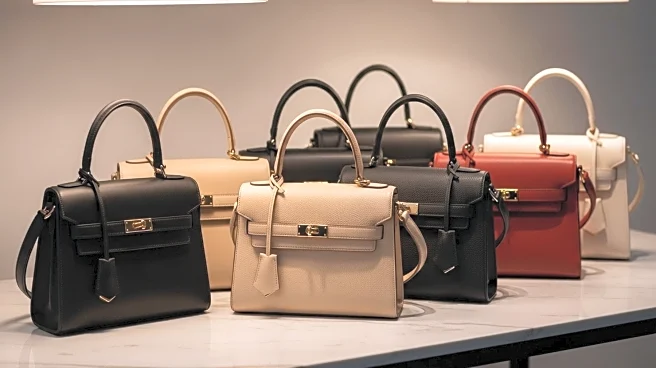What is the story about?
What's Happening?
Luxury brands are facing difficulties in appealing to Gen-Z consumers, as highlighted by a recent analysis of purchasing trends. Gen-Z, known for their digital nativity and value-driven purchasing decisions, are increasingly turning away from traditional luxury goods. Instead, they are opting for pre-loved items, affordable alternatives, or even counterfeits. This shift is attributed to the rising costs of luxury items and a growing preference for authenticity and community values over scarcity and hype. Despite efforts by luxury brands to engage with Gen-Z through experiential retail and influencer partnerships, sales have not met expectations. The report indicates that Gen-Z's net promoter score for luxury goods is significantly lower than that of Millennials, suggesting a disconnect between luxury brands and this younger demographic.
Why It's Important?
The changing preferences of Gen-Z consumers have significant implications for the luxury industry, which has traditionally relied on exclusivity and high price points to drive sales. As Gen-Z is projected to surpass Millennials in spending by 2030, luxury brands must adapt to meet the expectations of this demographic. Failure to do so could result in a loss of market share to secondhand markets and brands that align more closely with Gen-Z values. The shift towards authenticity and value alignment also reflects broader societal trends, where consumers are increasingly prioritizing sustainability and ethical considerations in their purchasing decisions. This trend could force luxury brands to rethink their marketing strategies and product offerings to remain relevant.
What's Next?
Luxury brands may need to further embrace the secondhand market and create content that resonates with Gen-Z's digital habits. This could involve more interactive and engaging marketing strategies, such as live shopping events, which have proven successful for platforms like eBay. Additionally, brands might consider enhancing their storytelling around craftsmanship and sustainability to appeal to Gen-Z's values. As the industry navigates these changes, it will be crucial for luxury brands to balance maintaining their traditional allure with adapting to the evolving consumer landscape.
Beyond the Headlines
The rise of Gen-Z's preference for vintage and secondhand luxury goods highlights a potential shift in the luxury market's value proposition. This trend not only challenges the traditional luxury model but also underscores the importance of sustainability in consumer choices. As Gen-Z continues to influence market dynamics, luxury brands may need to reconsider their production practices and supply chain transparency to align with the ethical standards of this generation.















